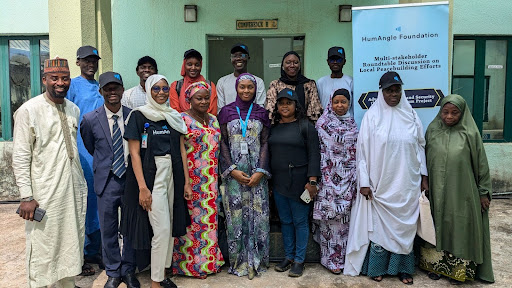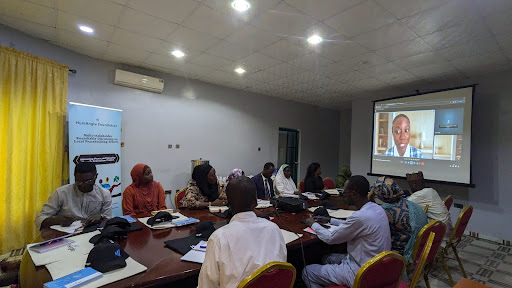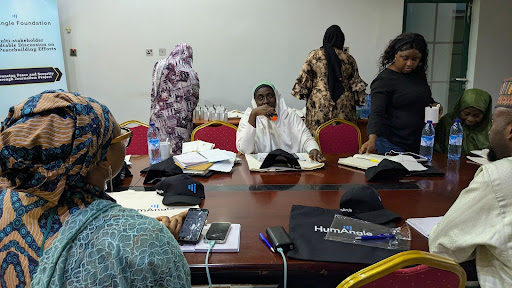HumAngle Foundation Hosts Roundtable on Local Peacebuilding and Countering Online Extremism
As part of its journalism-driven peace project, HumAngle Foundation engaged civil society actors in northwestern Nigeria on fact-checking extremist propaganda and using FOI tools to demand accountability.

In a bid to deepen local peacebuilding efforts and also confront the growing threat of online extremist propaganda, HumAngle Foundation, sister organisation of HumAngle Media, on Wednesday, June 25, brought together 15 civil society actors for a multi-stakeholder roundtable discussion in Kaduna, North West Nigeria.
The event is part of the organisation’s “Advancing Peace and Security through Journalism” project, which aims to equip journalists and civil society groups with tools to strengthen civic accountability and reduce conflict triggers.
With support from the National Endowment for Democracy (NED), the Foundation had earlier, in April, trained 15 journalists from across Nigeria’s six geopolitical zones during a three-day workshop in Abuja. The April training focused on conflict-sensitive reporting and innovative storytelling tools.
At the Kaduna roundtable, Angela Umoru-David, Director of the Foundation, introduced the participants to the HumAngle Freedom of Information (FOI) platform. Launched in 2024, the platform simplifies and facilitates the process of demanding accountability from government institutions.

“It is not just about asking what money was spent on,” Angela said. “It’s about probing how inclusion is budgeted for. Is there a ministry responsible? How do [ministries, departments, agencies] use their funds? What are the policies around gender inclusion and mainstreaming? These are the questions civil society actors should ask.”
She explained that HumAngle’s headquarters in Abuja is strategically placed to support FOI submissions on behalf of organisations working at the grassroots. Participants were also given a walkthrough of the platform’s interface and practical tips for navigating it.
The next session on fact-checking extremist content online was led by Aliyu Dahiru, who heads HumAngle’s Extremism and Radicalisation desk. He explored the strategies used by extremist groups for propaganda, radicalisation, and recruitment, particularly through social media platforms.
“In Northern Nigeria, Facebook is the dominant platform used by extremist groups,” Aliyu said, highlighting how extremists exploit emotional appeals and information overload to spread false narratives and incite violence.
He cited injustice, poverty, lack of opportunity, and ethno-religious mistrust as key drivers of radicalisation in the region. Aliyu encouraged civil society organisations (CSOs) to monitor local Facebook and WhatsApp groups for misinformation, train community members to detect fake and radical content, and partner with social media influencers to push counter-narratives.
“You can also document and share harmful content with us,” he added. “At HumAngle, we fact-check, analyse, and monitor. If you share with us, we will help verify the claims.”
Aliyu introduced the participants to practical verification tools such as InVID and Google Reverse Image Search for authenticating videos and photos.

The event concluded with a roundtable discussion moderated by Salmah Jumah, HumAngle Foundation’s Senior Programmes Officer. During the discussions, participants exchanged insights on extremist campaigns they have witnessed and the emerging challenges around the use of new media in conflict contexts.
While commending HumAngle for the initiative, Zainab Ibrahim, a participant who works with the Kaduna State Corporation, said that the roundtable reminded her that the spread of disinformation on violent extremism is not limited to social media. “Even the mainstream media is guilty of that,” she said, pledging to be more mindful in her coverage of sensitive issues.
Another participant, Hadiza Ismail, noted that she learned more about the growing influence of artificial intelligence in fuelling confusion and spreading fake content. “AI is here to stay, fortunately and unfortunately,” she noted, pointing out that AI-generated images and videos are often circulated by older people who may struggle to distinguish between real and fake visuals.
Hadiza said she is committed to contributing to community-level sensitisation to bridge this generational knowledge gap and reduce vulnerability to misleading content.
The roundtable reaffirmed HumAngle Foundation’s commitment to empowering local actors with the knowledge and tools necessary to counter extremism and foster inclusive, sustainable peacebuilding in conflict-affected regions.
HumAngle Foundation held a multi-stakeholder roundtable in Kaduna, Nigeria, to enhance local peacebuilding and address online extremism. The event, part of the "Advancing Peace and Security through Journalism" project, aimed to equip journalists and civil society with tools to demand accountability using the HumAngle FOI platform and counter extremist propaganda. Participants received training on fact-checking extremist content and learned strategies to combat misinformation on platforms like Facebook and WhatsApp.
The discussions emphasized the role of misinformation in violent extremism, highlighting the challenges posed by AI-generated fake content. Participants, including Zainab Ibrahim and Hadiza Ismail, shared insights on the influence of social media and AI in spreading false narratives, committed to local sensitization efforts. The roundtable reinforced HumAngle's dedication to empowering local actors to foster sustainable peace in conflict-affected regions in Nigeria.
Support Our Journalism
There are millions of ordinary people affected by conflict in Africa whose stories are missing in the mainstream media. HumAngle is determined to tell those challenging and under-reported stories, hoping that the people impacted by these conflicts will find the safety and security they deserve.
To ensure that we continue to provide public service coverage, we have a small favour to ask you. We want you to be part of our journalistic endeavour by contributing a token to us.
Your donation will further promote a robust, free, and independent media.
Donate HereStay Closer To The Stories That Matter




